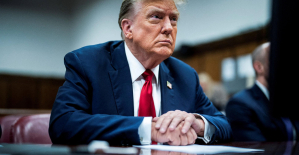We recently held a conference in Berlin. Our intention was to provide a platform for politicians and experts to exchange views on the financial risks that are likely to resurface in the euro area as a result of the fight against inflation.
So the idea was to talk about civil protection before the catastrophe, instead of slithering blindly into the crisis and then messing around like we did twelve years ago. A beautiful hotel on Charlottenstrasse should provide the right setting. But the idea didn't catch on. Only a small minority of the invited politicians recognized the purpose of the event and took the time to do so.
However, the intended policy seminar turned into an exciting private seminar, to which I owe many new insights. For example, I learned how, as early as the late 1960s, central bankers in the United States realized that major inflation was looming because of their policy mistakes. But they did not have the courage to immediately and decisively fight them. Instead, they cured the symptoms.
It wasn't until the early 1980s that the time was ripe for a frontal attack on inflation. It will be interesting to see what will be learned from the corresponding internal meeting minutes of our time, if they exist and if they are published in the more distant future.
In addition, the discussion further increased my skepticism about the future of the euro. French politicians in particular lured the Germans into the currency union after reunification with the false promise that they would respect the agreements to establish a hard currency as the successor to the D-Mark.
Since 2010, she and other politicians from Latin European countries have gradually broken this agreement and replaced the original agreement with a soft currency model, which serves as a means of public financing. Never in history has a monetary union of sovereign states constructed in this way survived, and the question is not if, but when and how this monetary union will collapse.
Finally, I learned that the areas of business and finance as well as politics follow completely different logics of action. While analytically sound problem solving is required in business and finance, I would see the logic of action in politics as determined by gaining and maintaining power.
The role of the citizen is largely limited to issuing admission tickets to the political actors in this area during elections. Once the actors have fought for this, they turn their attention to asserting their own claims to power at the expense of their competitors. The effort involved is so great that they simply no longer have the time to deal with analytically sound problem solutions.
Only in a crisis that requires immediate action do the political and analytical realms meet briefly. Being unprepared, political actors can then resemble blindfolded children trying to tail the donkey. At most, voices coming from the analytic realm can try to help that the tail goes to the buttocks and not to the head.
The logic of action of the financial investor is closer to me. This includes protecting yourself from the next euro crisis and (caution: politically incorrect!) possibly benefiting from it. So it is better to invest in gold and dollars than in euros.
Thomas Mayer is founding director of the Flossbach von Storch Research Institute.
"Everything on shares" is the daily stock exchange shot from the WELT business editorial team. Every morning from 7 a.m. with our financial journalists. For stock market experts and beginners. Subscribe to the podcast on Spotify, Apple Podcast, Amazon Music and Deezer. Or directly via RSS feed.

 New York: at Columbia University, the anti-Semitic drift of pro-Palestinian demonstrations
New York: at Columbia University, the anti-Semitic drift of pro-Palestinian demonstrations What is Akila, the mission in which the Charles de Gaulle is participating under NATO command?
What is Akila, the mission in which the Charles de Gaulle is participating under NATO command? Lawyer, banker, teacher: who are the 12 members of the jury in Donald Trump's trial?
Lawyer, banker, teacher: who are the 12 members of the jury in Donald Trump's trial? After 13 years of mission and seven successive leaders, the UN at an impasse in Libya
After 13 years of mission and seven successive leaders, the UN at an impasse in Libya What High Blood Pressure Does to Your Body (And Why It Should Be Treated)
What High Blood Pressure Does to Your Body (And Why It Should Be Treated) Vaccination in France has progressed in 2023, rejoices Public Health France
Vaccination in France has progressed in 2023, rejoices Public Health France Food additives suspected of promoting cardiovascular diseases
Food additives suspected of promoting cardiovascular diseases “Even morphine doesn’t work”: Léane, 17, victim of the adverse effects of an antibiotic
“Even morphine doesn’t work”: Léane, 17, victim of the adverse effects of an antibiotic Unemployment insurance: tightening of the rules on July 1
Unemployment insurance: tightening of the rules on July 1 Cancers, chronic diseases... Billions of workers hit by climate change, warns the UN
Cancers, chronic diseases... Billions of workers hit by climate change, warns the UN Closure of the A13 extended until at least mid-week
Closure of the A13 extended until at least mid-week Closure of the A13: Pécresse “asks the State to take charge of making the A14 free”
Closure of the A13: Pécresse “asks the State to take charge of making the A14 free” The series adaptation of One Hundred Years of Solitude promises to be faithful to the novel by Gabriel Garcia Marquez
The series adaptation of One Hundred Years of Solitude promises to be faithful to the novel by Gabriel Garcia Marquez Racism in France: comedian Ahmed Sylla apologizes for “having minimized this problem”
Racism in France: comedian Ahmed Sylla apologizes for “having minimized this problem” Mohammad Rasoulof and Michel Hazanavicius in competition at the Cannes Film Festival
Mohammad Rasoulof and Michel Hazanavicius in competition at the Cannes Film Festival UK lends Ghana treasures stolen during colonization
UK lends Ghana treasures stolen during colonization Skoda Kodiaq 2024: a 'beast' plug-in hybrid SUV
Skoda Kodiaq 2024: a 'beast' plug-in hybrid SUV Tesla launches a new Model Y with 600 km of autonomy at a "more accessible price"
Tesla launches a new Model Y with 600 km of autonomy at a "more accessible price" The 10 best-selling cars in March 2024 in Spain: sales fall due to Easter
The 10 best-selling cars in March 2024 in Spain: sales fall due to Easter A private jet company buys more than 100 flying cars
A private jet company buys more than 100 flying cars This is how housing prices have changed in Spain in the last decade
This is how housing prices have changed in Spain in the last decade The home mortgage firm drops 10% in January and interest soars to 3.46%
The home mortgage firm drops 10% in January and interest soars to 3.46% The jewel of the Rocío de Nagüeles urbanization: a dream villa in Marbella
The jewel of the Rocío de Nagüeles urbanization: a dream villa in Marbella Rental prices grow by 7.3% in February: where does it go up and where does it go down?
Rental prices grow by 7.3% in February: where does it go up and where does it go down? Europeans: “All those who claim that we don’t need Europe are liars”, criticizes Bayrou
Europeans: “All those who claim that we don’t need Europe are liars”, criticizes Bayrou With the promise of a “real burst of authority”, Gabriel Attal provokes the ire of the opposition
With the promise of a “real burst of authority”, Gabriel Attal provokes the ire of the opposition Europeans: the schedule of debates to follow between now and June 9
Europeans: the schedule of debates to follow between now and June 9 Europeans: “In France, there is a left and there is a right,” assures Bellamy
Europeans: “In France, there is a left and there is a right,” assures Bellamy These French cities that will boycott the World Cup in Qatar
These French cities that will boycott the World Cup in Qatar Basketball (F): big winner of Asvel, Basket Landes will face Tarbes in the semi-final of the League
Basketball (F): big winner of Asvel, Basket Landes will face Tarbes in the semi-final of the League Football: Yazici (Lille) “in shock” after an attempted theft at his home
Football: Yazici (Lille) “in shock” after an attempted theft at his home Serie A: victorious over AC Milan, Inter crowned Italian champions for the 20th time
Serie A: victorious over AC Milan, Inter crowned Italian champions for the 20th time Serie A: “Winning a title in a derby has never happened,” relishes Martinez after Inter’s coronation
Serie A: “Winning a title in a derby has never happened,” relishes Martinez after Inter’s coronation


















